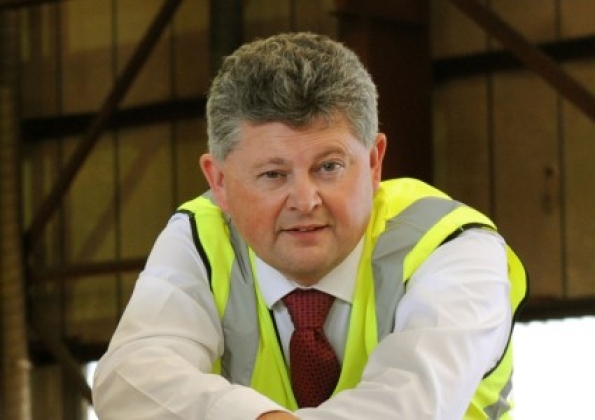
By Bernard Ginns Business Editor
Published on Tuesday 30 August 2011 09:18
When floods devastated Western Australia at the beginning of the year, Laurence McDougall acted quickly.
The Managing Director of All Steels Trading knew that steel prices would rise sharply as Australia produces 70 per cent of the world’s iron ore.
In spite of the UK bank holiday, he hit the phones and fired off emails and started buying as much as his company could afford.
“For us, it was there in black and white what would happen,” said Mr McDougall, who emphasises the importance in trading of being able to recognise events and react to them.
His quick thinking about the disruption to iron ore supply and its impact on the price of steel made a fortune for the five-year-old company, which this year is expected to report a 30 per cent increase in turnover to £40m-£45m.
The Thirsk-based business has potential to expand further, but is constrained by the availability of finance and the risk appetite of banks, said Mr McDougall, who has spent his working life in the steel industry.
The 47-year-old set up the company in 2006 with business partner John Thompson, 61, the owner of Tomrods, a £12m-turnover steel stockholding business.
They source steel from mills in Turkey, Egypt, Spain, China and Brazil and sell it across the UK to stockholders and end users.
Alongside their joint-owned trading and stockholding companies, the partners have acquired controlling interests in two specialist manufacturing companies.
The £6m-turnover Legg Brothers company makes small steel sections for a diverse international customer base. The £5m-turnover Steel Ball Company makes grinding parts for the mining and energy industries. Both benefit from lower input costs, with raw materials supplied by the stockholding business.
Mr McDougall plans to expand the trading business into Europe, to industrialised countries like Germany, Holland, Belgium, France, and to Scandinavia.
He also plans to grow the specialist businesses, firmly believing that manufacturing has an important role to play in the UK’s future.
“We still have a fantastic manufacturing knowledge in the UK,” he said.
“We have got an unrivalled reputation in terms of quality. The Chinese are still the cheapest for most products, but when it comes to attention to detail and providing a quality product, the UK still has a huge advantage.”
The UK can compete on better terms thanks to increasing automation reducing any disadvantage from high wages, the levelling of raw material costs and replacement of state-backed industries in rival countries with privately-owned commercial enterprises, said Mr McDougall.
He said that Britain’s position as a net importer gives it an advantage through the opportunity to “backload” lorries returning to Europe. He maintains that it is cheaper to transport goods from Goole to Germany than it is from Goole to the West Midlands.
All Steels Trading keeps costs down by outsourcing its logistics and some of its sales operations. Its focus is on converting stock into cash as quickly as possible.
Mr McDougall said the ability to succeed on the global stage increasingly comes down to market and manufacturing knowledge.
He added: “Hopefully manufacturing will grow in the UK. I’m certainly trying to do my bit to revive manufacturing and make sure we win over some of our European and world competitors. We have picked up business over the last two years as a result of a French mill closing down and an American mill rationalising its range.”
The market for steel is a competitive and volatile one. A year after the Company was founded, steel started trading as a commodity in the London Metal Exchange and is now the subject of increasing speculation.
Meanwhile, stellar growth in emerging economies is driving price inflation after countries like China, India and Brazil embarked on large-scale infrastructure projects.
“When I came into the industry in the early 80s, world demand was around 750m tonnes,” said Mr McDougall.
“Last year, the steel market was 1.4bn tonnes. By 2018, they are saying it is going to be 1.8bn.”
It is a different story in the UK, however.
Demand in 2008 was 1.8m tonnes. This year it is expected to be 650,000 tonnes, said Mr McDougall.
He added: “Against that background, our stockholding business is growing.”
Keeping an eye on the trends
Laurence McDougall starts his working day at 6.30am, spending an hour studying market reports and global events and how they might affect the price of steel.
He looks for trends in supply and demand – aiming to buy at the bottom of cycles – and also pays close attention to exchange rates. A large amount of his time is spent with bankers.
“They have been supportive, but we have had to fight for every bit of finance we have got along the way,” he said.
Mr McDougall, the son of a long-distance lorry driver from Warrington, spent most of his career at Lord Paul’s Caparo Group before setting up All Steels Trading.